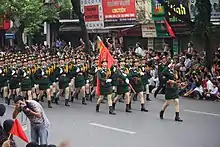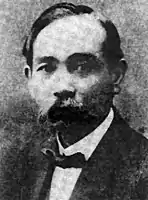Nguyễn Thái Học Street
Nguyễn Thái Học Street (phố Nguyễn Thái Học) is a major street in Ba Đình District, Hanoi.

Female troops parading on the street during the Millennial Anniversary of Hanoi
History
The old name of the Street was Duvillier Street, but became known as phố Hàng Đẫy. Under the French this became Rue Duvillier in 1908,[1] named after a French official.[2] This became the phố Hàng Đẫy, then phố Phan Chu Trinh in 1945,[3] then finally the street was given the revolutionary name Phố Nguyễn Thái Học in 1950.
Notable buildings
The street contains many merchant houses.[4]
- No.65 (Số nhà 65 Nguyễn Thái Học) was an artists colony, in which a dozen artists worked, lived and held a gallery.[5]
- No.66 Nguyễn Thái Học, is the Vietnam Fine Arts Museum. The building, built in 1937, was an abandoned Catholic girl's boarding house.
- Temple of Literature, Hanoi (Văn Miếu-Quốc Tử Giám)
References
- Đình Hoà Nguyêñ From the city inside the Red River: a cultural memoir of mid Century Vietnam 1999 Page 78 "The family homestead covered a large area bounded by Sinh-Tử Street, later named Rue Duvillier, on which ran the "tramway" or streetcar line linking the capital city to Hà-Đông, a provincial town located eleven kilometers from Hanoi. p84 The street was renamed Duvillier Street only in 1908, after the lake which it skirted was filled in order to allow the
- "... prédécesseur Duvillier, la tête de la Commission criminelle du Tonkin."
- Xavier Guillaume La Terre du Dragon Tome 1 - Page 251 "Nguyên Thai Hoc (rue) (1950) = rue Phan Châu Trinh (1945) = rue Hàng Dây = rue Duvillier"
- Guide to Vietnam John R. Jones - 1994 "Merchant Houses The best examples are on Nguyen Thai Hoc and Tran Phu Street. Look out for carved roof beams, wooden balconies, pulleys hanging down from wooden beams, carvings on wooden walls, Yin and Yang symbols on roof "
- 65 Nguyen Thai Hoc Street Archived 2011-01-28 at the Wayback Machine
This article is issued from Wikipedia. The text is licensed under Creative Commons - Attribution - Sharealike. Additional terms may apply for the media files.
